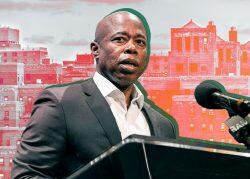UPDATED May 17, 2022, 7:12 p.m.: As the mayor makes a last-minute push to save an affordable housing tax break, City Council members planned to rally for its demise.
With seven working days left in the state’s legislative session, Mayor Eric Adams is traveling to Albany to make his case for a replacement for 421a. Meanwhile, the City Council’s Committee on Housing and Buildings planned a hearing Tuesday on a resolution calling on the state to let it die.
But the Council canceled the hearing without explanation. A spokesperson said it was deferred and has not been rescheduled.
One possibility is that the Adams administration, which sources said plans to release its housing plan soon, prevailed on Council leaders to back off. [Editor’s note: A Council leader said Tuesday evening that the hearing was pushed back to allow state legislators, who were in session Tuesday, to participate.]
The Council resolution argues that the June 15 expiration of 421a “creates an opportunity for the New York State Legislature to review problems with New York City’s property tax system and finally make long overdue changes.”
The hearing was also supposed to focus on a state bill to implement good cause eviction statewide. The measure would give tenants a defense against eviction if their rent were raised by more than 3 percent or 1.5 times the regional inflation rate, whichever is higher.
Read more



It will ultimately be up to state lawmakers to renew or replace the tax break. But since a replacement program proposed by Gov. Kathy Hochul, dubbed 485w, was dropped from the state budget, the issue has failed to gain traction among lawmakers. The chances of a resolution before the end of the session, slated for June 2, seem slim.
“I’m not overly optimistic,” said Gary LaBarbera, president of the state and city chapters of the Building and Construction Trades Council.
“There’s no one championing it. We’re on this merry-go-round,” he said, adding that lawmakers want affordable housing, but not to subsidize or incentivize it. “When we say, ‘What would you like?’ there is uncertainty.”
LaBarbera has lobbied for 485w, joining forces with the Real Estate Board of New York. The two were on opposite sides the last time the tax break expired, with LaBarbera fighting for prevailing wage requirements on all projects that receive the exemption. It lapsed for more than a year, until the parties reached an agreement that included some of the wage rules sought by the unions.
Developers argue that without the program, no multifamily construction will move forward in the city. Financing for projects that cannot beat the June 15 deadline has already come to a halt.
The governor’s replacement program calls for deeper and permanent affordability, but critics of 421a say it is much like its predecessor.
Developers maintain that the 35-year tax abatement is critical to housing construction in the city, given the high property taxes and other costs facing rental projects. A recent report by New York University’s Furman Center found that a majority of multifamily units built between 2010 and 2020 were beneficiaries of 421a.
In testimony prepared for Tuesday’s canceled hearing, the Real Estate Board of New York argues that the city and state cannot match the level of investment that the private sector contributes to the creation of affordable housing.
The trade group also planned to testify against good cause eviction, saying that it “will ensure a cycle of disinvestment, will discourage new supply, and makes the debate over 421a moot.”
Tenant advocates and elected officials plan to rally in Albany to demand passage of good cause eviction legislation before the end of the legislative session. An earlier effort failed to persuade lawmakers to pass the bill before the eviction moratorium expired Jan. 15.
When asked last week about the property tax break, Manhattan Sen. Brian Kavanagh, who chairs the Senate’s housing committee, said he did not know “if or when we’ll be revisiting that.” Although 421a is a complex issue and intertwined with other complicated topics such as property tax reform and Mandatory Inclusionary Housing, the senator noted that in past years, major policy issues have been worked out in the final days of the session.
